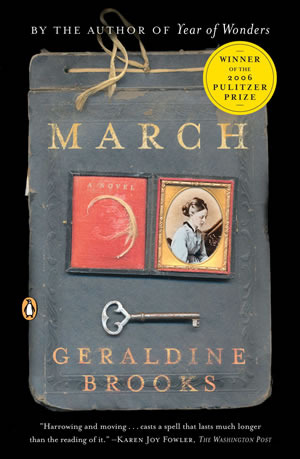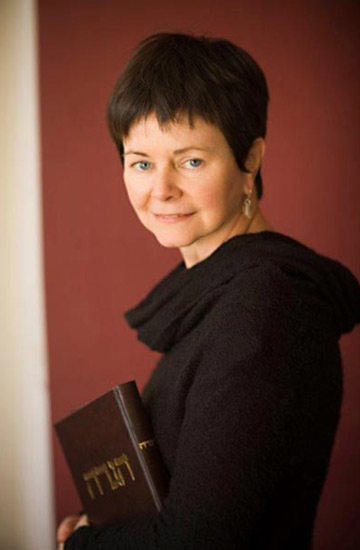March by Geraldine Brooks December 18, 2020

The following post includes affiliate links. More details here. As you’re doing your Amazon shopping, we’d be ever so grateful if you’d use our affiliate link to do so as it helps pay the bills around here!

Dear readers, it is cold outside, which means I want to curl up in front of a fire, with a blanket, a hot beverage, and my warm dog, just like every day, but I digress. As it’s cold, I’m drawn to books that make me thankful I’m safe and inside, with central heat and lots of blankets. Books I feel drawn to include characters who defy the elements, and often people’s opinions of them, like Elizabeth in Janette Oke’s When Calls the Heart (although the scene I’m thinking of is in book #4 of the series) and Feyre in Sarah J. Maas’s A Court of Thorns and Roses series. Let Feyre suck you into her world this winter as the days are still growing shorter. Let her show you how “the forest had become a labyrinth of snow and ice” and what happens when a young woman goes hunting in the dead of winter to feed her family. Let her show you courage and perseverance, which we all need a little more than usual this season, and then sign up here to join us to talk about it, and the rest of the extended trilogy, on Friday, February 12 at 7:30 p.m.

It’s not a spoiler that I generally want more cowbell epilogue, so when Ashley told me about Geraldine Brooks’s March I was committed to reading it. While I do want more epilogue, I’m also here for more prologue, and a different point of view, particularly from a character who’s largely off-screen during the original! March is the story of Mr. March, and to a lesser extent Marmee. Brooks lets us tag along with Mr. March on his journey during the Civil War, and while we’re seeing what Alcott doesn’t share in his letters to his little women in her tome, we also see glimpses into the man Mr. March is before he meets Marmee, and during their courtship and early marriage as well. Yes readers, I like more background, more follow-up, and really just more words, pages, chapters, and books to read about characters who are near and dear to my heart! (See also: why I love a series!)
All that said, when I first read March, it had been decades since I’d read Little Women, so I didn’t have the recent memory of Alcott’s Mr. March that I have now. However, even in my early text of Little Women Mr. March feels very much in the periphery of the story. In some ways he very much is, especially in the first volume, but even in the second, his world is separate from that of the women in his life, which feels very much in line with my understanding of the times and their societal standing.
As much as Little Women feels like a coming of age story for Jo, Meg, Beth, and Amy, March feels like that for Mr. March, with a side of Marmee. When we meet Mr. March, in the beginning of this tale, he’s writing letters home. He’s traveling through Virginia with his unit, and stumbles upon the same path he walked 20 years ago as a traveling salesman just shy of his nineteenth birthday, and masterfully Brooks transitions us through 1861 and 1841, helping us to understand how Mr. March became the man whose values and convictions inspire Marmee and their daughters. Brooks shows the readers the experiences that shaped this man, how he met Margaret Marie Day, and what drew them together. Perhaps my favorite pieces of this book were the glimpses that spoke to specific passages in Little Women. As someone with a bit of a temper, I adore the scenes in Little Women when Marmee and Jo discuss Jo’s temper and how she’s very much like Marmee was before she learned more self-control. Reading about the history of this, the truth of how Marmee struggled and stumbled with her temper in March makes her guidance to Jo in Little Women so much more rich and meaningful. Brooks does this throughout, and I don’t want to spoil more, because if you adore Little Women, I do hope you’ll give March a read too, especially as it’s only 280 pages and would make for a perfect Jólabókaflóð read.
I give March a solid four stars and am likely to reread it again. I’m also interested in Brooks’s other titles, and particularly intrigued after figuring out she was married to Tony Horwitz (of Travels with Tony and Fred) until his passing in 2019. (In case you’re wondering, I’m 100% here for Pulitzer Prize winning power couples. I’m confident Ashley has more in store for us on Brooks’s part of that.) I love a well-told story that sheds a different light on a familiar story and enriches it (yes, that does mean I’m here for fanfic, as long as it’s well done!). March is that, and it’s also a gorgeous tale in it’s own right. If you’re wondering what to give that Little Women fan in your life, stalk them on Goodreads, and consider this title.
What book has given you a heart-felt deep dive into a familiar title or topic?
~Nikki

Geraldine Brooks won the Pulitzer Prize in Fiction in 2006 for her novel March and it is unreservedly earned. An Australian-born and -educated journalist, Brooks began her career working for The Sydney Morning Herald, won a scholarship for a journalism master’s program at Columbia University in New York in 1982, then worked for The Wall Street Journal where she covered crises in the Middle East, Africa, and the Balkans. She is the author of five novels and three works of non-fiction, including Nine Parts of Desire: The Hidden World of Islamic Women and her memoir Foreign Correspondence. I’m considering her memoir as my next jump into Brooks’ work rather than another of her novels, but I’m here for those, too. She married Tony Horwitz in Tourette-sur-Loup, France, in 1984 and has lived as child of the world in their homes in Sydney, Australia, and Martha’s Vineyard, Massachusetts – though during the writing of March, as is mentioned in the afterword, a former home in Virginia gave her the nugget of inspiration for March when a contractor found a Civil War soldier’s belt buckle in the yard. This 8 minute interview from NPR is a short listen and it’s interesting to hear of the inspiration for the story from the author’s voice.
I definitely consider the marriage of Brooks and Horwitz to exemplify the term ‘power couple,’ but March is itself a book about marriage and the struggles each spouse has in living their life for and with another person. Forgive me for taking a large chunk out of the afterword, but this quotation, for me, exemplifies how someone can change within themselves and their marriage:
Lastly, I should like to take a flyleaf from George Eliot’s Middlemarch, which she dedicated to her “dear husband . . . in this nineteeth year of our blessed union.” In the nineteeth year of our own union, I retract unreservedly my former characterization of my husband, Tony Horwitz, as a Civil War bore. Further, I would like to apologize for all the times I refused to get out of the car at Antietam or whined about the heat at Gettysburg; for all the complaints about too many shelves colonized by his Civil War tomes and all the moaning over weekend expeditions devoted to events such as the interment of Stonewall Jackson’s horse. I’m not sure quite when or where it happened, but on a sunken road somewhere, I finally saw the light.
The story between Mr. March and Marmee is the story of two people, in their separate inner lives and together in their marriage. Marmee takes over some of the narrative when Mr. March is injured, and we are gifted with her perspective on his idealism (an idealism they both share and which brought them together) and the struggles that idealism brings to their married life. We know things she doesn’t know, however, about how the war has made March reconsider the ideals and truths to which he once so staunchly held. I highlighted 33 sections of this book, which is considerable for only having read it once, and every single one of them is a golden example of poetic writing and deep insight. I am loathe to spoil the book, as usual, but I love how a perfect example of a struggle that Mr. March’s expectations and ideals bring to their marriage is that the passion and anger and ability to express herself March claims is Marmee’s self-degradation with her lack of self-mastery are the very things which attracted him to her before they wed! Oh, the irony, dear readers! And what woman doesn’t feel those same hypocrisies in her own marriage at some point or another? These life-truths found in fiction are disturbing and force one to think, but also admit as Marmee does: For to have asked him to do otherwise would have been to wish him a different man. And I knew then that I loved this man. This inconstant, ruined dreamer.
What was the last work of fiction you read that made an impact on the way you viewed something in real life?
~Ashley

PLEASE SUPPORT US WHEN YOU SHOP BY FIRST CLICKING ON THE IMAGES BELOW:








